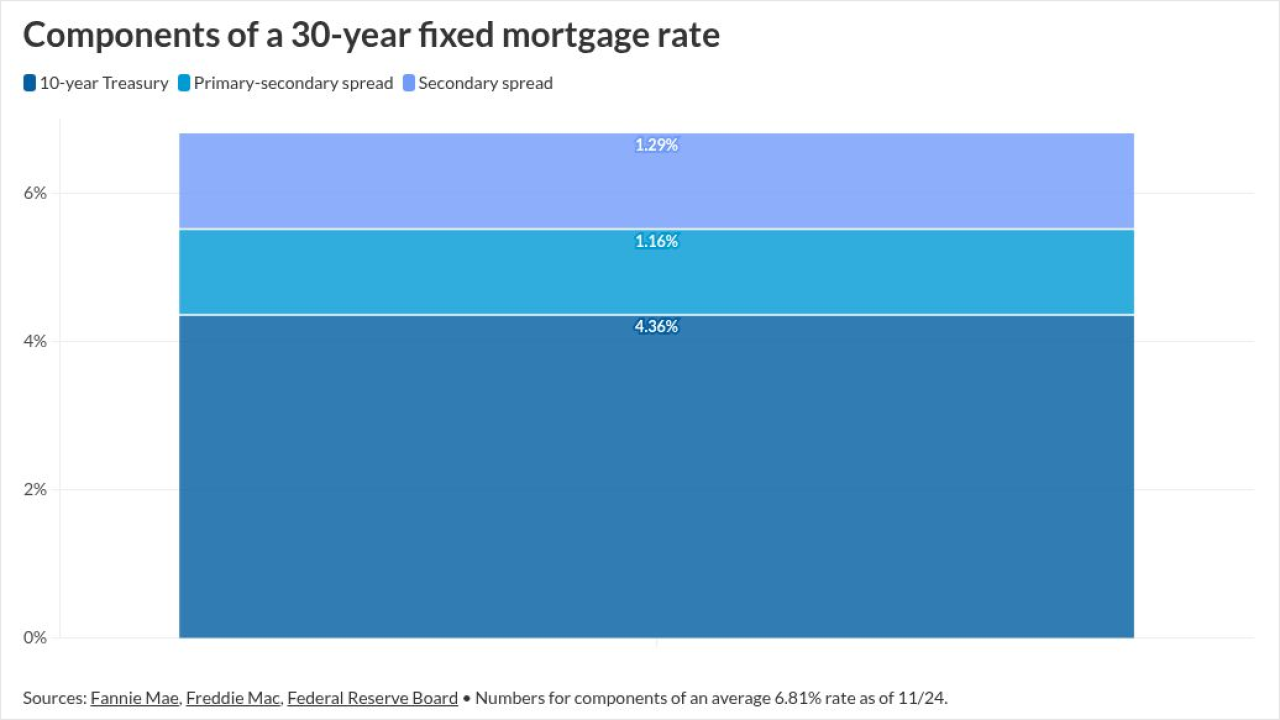WASHINGTON — The Senate is set to begin teeing up housing finance reform discussions at a Banking Committee hearing on Thursday, but many are skeptical that Congress will be able to succeed where it has failed in the past.
Despite moves toward a bipartisan solution, the political atmosphere remains hyperpartisan, with Republicans and Democrats agreeing on very little.
“There is a political chasm between the two parties and it is difficult to be optimistic about any significant legislation in this Congress,” said Isaac Boltansky, a policy analyst at Compass Point Research & Trading.
It will soon be nine years since Fannie Mae and Freddie Mac were seized by the government and placed into conservatorship. Policymakers have been struggling to figure out what to do with them ever since.

The most politically promising effort is led by Sens. Bob Corker, R-Tenn., and Mark Warner, D-Va., who previously pushed a bill to wind down Fannie and Freddie and replace them with private entities with access to an insurance fund run by the government in case of catastrophic losses.
That bill was adopted by Sen. Mike Crapo, R-Idaho, who now heads the Banking Committee, and is expected to form the backbone of any new plan. Corker, Warner and Crapo have suggested the new effort will be simpler than the previous iteration and seek to address various criticisms.
“Corker and I decided that we would kind of put the band back together and recognize, again, that there is unfinished business to do here,” Warner said at a recent event.
But though Warner expressed optimism about the attempt, he acknowledged it will not be easy.
“How do we deal with some forces in both political parties that simply want the status quo?” he said.
Crapo and other lawmakers may provide more details at the hearing on Thursday, which features witnesses from the mortgage industry, the head of a consumer group and a former top regulator for Fannie and Freddie.
But some of the challenges are already clear. Following is a guide to just some of the difficulties facing a successful reform bill.
Ticking time bomb
Chief among the issues facing lawmakers is that currently Fannie and Freddie give all of their profits to the U.S. government. At a time when the Trump administration is pushing tax reform and policymakers are searching for new government revenue, the “profit sweep” is difficult to give up.
But even if lawmakers don’t act, the situation is untenable. Fannie and Freddie have not been allowed to rebuild capital, making it certain that — sooner or later — they will require a draw on the Treasury Department to stay afloat. That could spark a panic in the market.
“They just have to wobble a little bit and it gets very ugly from a systemic perspective very fast,” said Karen Shaw Petrou, co-founder and managing partner of Federal Financial Analytics.
Federal Housing Finance Agency Director Mel Watt has warned lawmakers he won’t let it get to that point. Although the profit sweep rests on a joint move by the FHFA and Treasury several years ago, Watt has said he may unilaterally scrap it if Fannie and Freddie begin to run low on capital.
“The existing agreement gives us the authority to either declare or not declare a dividend,” Watt told the banking panel during a May hearing.
Laurence Platt, a partner at Mayer Brown who advises clients on housing finance reform issues, said that withholding profits from Treasury is different than taking a draw.
“Not giving money to the Treasury is not as big a deal as taking money from the Treasury,” Platt said.
The sweep was a mechanism designed to put pressure on Congress to come up with a legislative solution, but some stakeholders stand ready to throw their support behind Watt.
“This is a crisis we can avoid, it can be changed and FHFA and Treasury can do this and we strongly encourage them to do that,” said Ron Haynie, senior vice president of mortgage finance policy for the Independent Community Bankers of America.
Small-bank objections
Crapo, Corker and Warner also have to deal with community bankers who are wary of their plan. Community banks are one of the few constituencies in the banking industry that continue to have clout, and their support or opposition could help sway moderate Democrats like Sens. Jon Tester of Montana and Heidi Heitkamp of North Dakota.
The ICBA opposed the Corker-Warner measure last time around because it felt it would essentially hand the mortgage market over to the biggest banks and leave community banks out in the cold.
They argue that a simpler solution is to recapitalize Fannie and Freddie with reforms to make them safer and sounder.
“A lot of these plans seem to drive to this notion that you have got to tear up what works,” Haynie said. “We don’t understand the reasoning behind that because there is a lot that works with the GSEs and for community banks, small midsize lenders even regional banks.”
They also say plans to break up Fannie and Freddie and sell off pieces of it to the private sector would likely benefit Wall Street bankers with deep pockets.
“We don’t think busting them up and selling off pieces of them solves a problem,” Haynie said. “We think it creates an additional one.”
But other stakeholders in the debate disagree. After the mortgage meltdown and the taxpayer bailout, they say, real reform with more private capital at stake is needed.
“I don’t think that a plan that lets the GSEs simply rebuild their capital is the right way to go,” said Jerry Howard, CEO of the National Association of Home Builders. “I think we need Fannie Mae and Freddie Mac to come out of conservatorship.”
Affordable housing
Another big unknown is whether Democrats continue to hold the line on new affordable housing requirements.
In 2013, the Corker-Warner bill was pushed by then Chairman Tim Johnson, D-S.D., and Crapo, and cleared the panel, but lacked sufficient support from Democrats to make it through the full chamber. The key issue then was whether the new system did enough to support affordable housing.
That remains a big concern for many Democrats. Warner has said the new effort will address this issue, but it’s hard to see how he can balance Democratic demands on one hand with Republican skepticism of new affordable housing requirements. In many ways, that issue is a symbol of the larger debate.
“What is complicating is the disparate interests of the far right on the one hand and the far left on the other,” Howard said. The far right’s “notion of the government not being involved is simply impractical and the far left using the affordable housing element as a stalking horse for other interests is equally unachievable and inappropriate.”
Democrats and the politically powerful National Association of Realtors are likely to insist on preserving the 30-year fixed-rate mortgage, a product that is easier to offer with government support.
“It is more important than ever that Congress reform the secondary mortgage market in a way that preserves affordable access to credit for qualified buyers and maintains the availability of the 30-year fixed-rate mortgage,” said the Realtor group's president, William E. Brown.
Finding common ground with the House
Even if an agreement could be struck in the Senate — which is by no means certain — House leaders appear set on a different path.
House Financial Services Committee Chairman Jeb Hensarling recently recommitted to a bill he pushed in 2013 that would have eliminated Fannie and Freddie and largely removed the government from the mortgage market.
“I believe” the Path Act “still represents the best vehicle for reform,” Hensarling said earlier this month.
It’s not clear that House Republicans would agree to a Senate bill where the government continues to play a prominent role.
“Republicans are not about to vote for a brand new taxpayer guarantee,” said Rob Zimmer, principal at the financial services and public affairs consulting firm TVDC and a former lobbyist for Freddie.
Still, Hensarling will be term-limited by Republican rules and entering his final year as chairman of the financial services committee in 2018. Some speculate it may make him more willing to deal.
“For [Hensarling], he has been compromising a lot,” said Petrou, pointing out that Hensarling scrapped a controversial provision in a Dodd-Frank reform bill earlier this year to secure its passage in the House. “That is going to be key. If he is willing in his last year of chairmanship to go for a win, that makes a difference.”
If Hensarling stands firm and the Senate is unable to sort out the differences between stakeholders, the status quo will likely prevail.
“There is no sense of urgency among the rank and file on the Hill to address the mortgage market because it is largely functioning right now,” Boltansky said.




